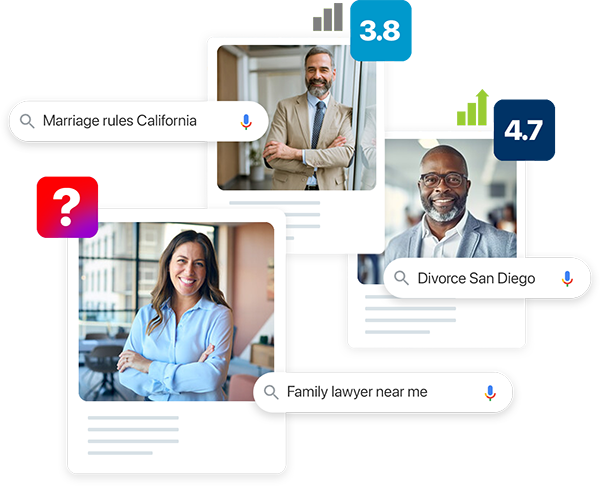As Google’s search engine evolves, law firms have a powerful new opportunity to enhance visibility and attract potential clients: Google’s AI Overviews. These AI-generated summaries appear at the top of search results and are designed to provide quick, reliable answers. For law firm websites, earning a spot in these summaries can mean increased traffic, higher authority, and stronger trust with prospective clients.
But appearing in these overviews doesn’t happen by accident. Google’s AI prioritizes content that is accurate, well-structured, and responsive to search intent. If your content can deliver direct, useful answers—especially in a legal context—you’re in a strong position to benefit from this feature.
Here’s how to make your firm’s website more discoverable and competitive in an AI-driven search environment.
What Are Google’s AI Overviews?
Unlike traditional featured snippets that pull from a single webpage, Google’s AI Overviews aggregate and synthesize information from multiple sources. The goal is to provide users with immediate context and clear answers without needing to click through multiple links.
For legal websites, this means that your content needs to be:
- Highly relevant to specific search queries
- Easy for AI to interpret
- Structured for readability and accuracy
If your website answers a user’s legal question concisely and confidently, it may be chosen as part of an AI-generated summary.
Step 1: Structure Content Clearly for AI and Users
Good structure is essential—for both human readers and Google’s AI. The more easily your content can be scanned and understood, the more likely it is to be selected for an overview.
Best Practices:
- Use clear headers and subheaders to guide readers through the content.
- Break up complex legal topics into bullet points or numbered lists.
- Keep paragraphs short and focused.
- Use plain language whenever possible. Avoid overloading the page with legal jargon.
Think of your content like a legal brief: organized, intentional, and easy to follow. A well-structured blog post titled “What Is a Living Trust in California?” with logical sections (e.g., definitions, benefits, how to set one up) is more useful to Google than a long, unbroken wall of text.
Step 2: Provide Direct, High-Value Answers
Google’s AI prioritizes answers that are both direct and complete. In the legal world, that means anticipating client questions and addressing them succinctly.
Strategies for Law Firms:
- Create FAQ sections on key practice area pages (e.g., “Can I get a DUI expunged in Washington State?”).
- Write educational blog posts that answer long-tail queries like “What happens if I die without a will in Oregon?”
- Define legal terms clearly and briefly: “A power of attorney is a legal document that gives someone else the authority to act on your behalf.”
This approach aligns with what’s known as Micro SEO—a strategy that targets very specific, often overlooked questions to serve niche audiences effectively.
The more focused your answer, the more likely Google’s AI is to identify your content as a reliable resource.
Step 3: Implement Schema Markup
Schema markup is a form of structured data that gives search engines extra context about your content. It helps Google better understand and categorize your site—which, in turn, can boost your chances of being included in an AI Overview or rich snippet.
Types of Schema Relevant to Law Firms:
- FAQPage schema: Highlights Q&A sections for quick parsing.
- HowTo schema: Ideal for step-by-step guides (e.g., how to file for divorce in your state).
- LegalService or Attorney schema: Provides detailed information about your firm.
To get started, use tools like Google’s Structured Data Markup Helper or WordPress plugins such as Rank Math or Yoast SEO. Always validate your markup using the Rich Results Test.
Proper schema helps your content “speak” Google’s language.
Step 4: Maintain Content Accuracy and Freshness
Google’s AI is designed to prioritize trustworthy and up-to-date information. That means legal websites must keep content current, especially when discussing laws, deadlines, or regulations that change frequently.
Tips to Stay Current:
- Regularly audit your existing content to refresh outdated information.
- Update statistics, timelines, or forms as legislation changes.
- Cite reputable sources, such as government websites or court rulings, to boost credibility.
- Monitor search trends and adjust your content accordingly.
If you wrote a blog on eviction moratoriums during the COVID-19 pandemic, for example, make sure it’s been updated to reflect post-pandemic legal realities. Fresh content signals reliability—to users and Google alike.

Find out where you stand with a local keyword report.
Step 5: Focus on Local SEO for Legal Services
Legal services are inherently local, and Google’s AI Overviews favor websites that clearly identify their location and relevance to the searcher’s geography.
Local SEO Must-Haves:
- Consistent Name, Address, and Phone Number (NAP) across your website and directories.
- An optimized Google Business Profile.
- Reviews from local clients on Google and legal directories like Avvo.
- Location-specific blog posts (e.g., “DUI Penalties in Maricopa County” or “Child Custody Laws in Olympia, WA”)
These steps help establish your firm as a local authority, increasing your visibility both in AI summaries and the broader search ecosystem.
Step 6: Build Authority Through High-Quality Backlinks
Earning backlinks from respected legal and local websites remains one of the strongest signals of authority to search engines.
Ways to Earn Backlinks:
- Guest post on legal industry blogs
- Submit to legal directories (Justia, FindLaw, Nolo)
- Partner with local news outlets or community organizations
- Share legal insights on LinkedIn or legal forums
The more external validation your content receives, the more likely it is to be viewed as authoritative by AI.
Step 7: Monitor SEO Performance and Stay Flexible
Optimization is an ongoing process. Use tools like Google Analytics and Search Console to monitor what’s working and where your traffic is coming from.
Track metrics such as:
- Organic traffic by page
- Bounce rates
- Click-through rates on legal blogs or service pages
- Conversions (form fills, calls, consultations)
Staying agile—especially as Google evolves—allows your firm to adapt and remain competitive.
Final Thoughts: Positioning Your Firm for AI-Powered Search
Google’s AI Overviews represent a major shift in how potential clients discover legal services online. By writing clear, helpful content and implementing thoughtful technical SEO practices, your law firm can be part of the answers users see first.
Focus on:
- Creating detailed, helpful content
- Answering client questions directly
- Keeping your website current and trustworthy
- Using schema and SEO tools strategically
Doing so will not only improve your chances of being featured in AI Overviews but also solidify your law firm’s position as a go-to resource in your practice area and region.
Ready to Strengthen Your Law Firm’s Online Visibility?
At LegalRev, we specialize in helping law firms like yours attract more clients through strategic, search-optimized content and modern digital marketing solutions. Whether you need help optimizing your website for Google’s AI Overviews, improving your local SEO, or creating content that converts—our team is here to help.
Let’s build your firm’s digital presence together. Contact us today to schedule your free consultation.




